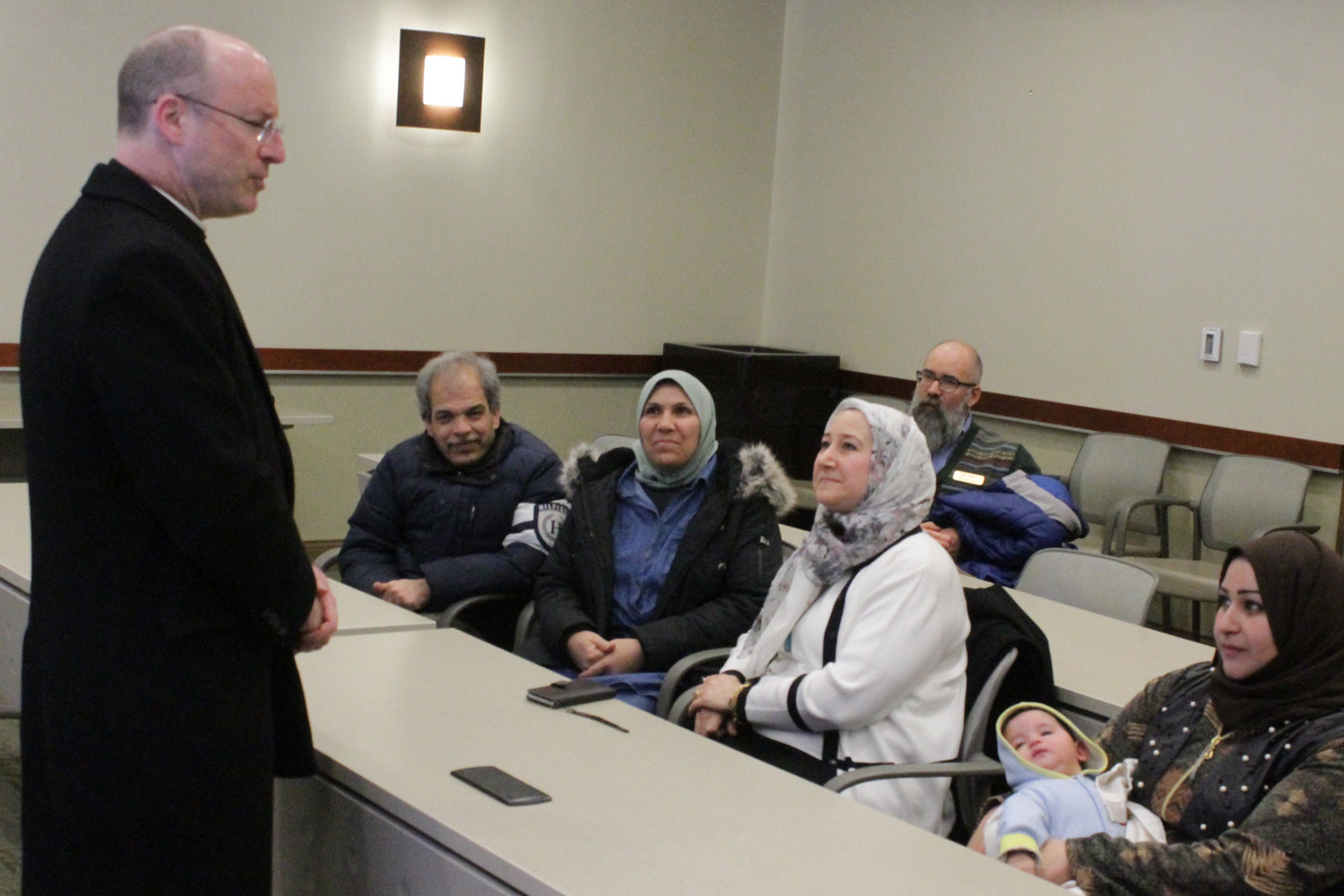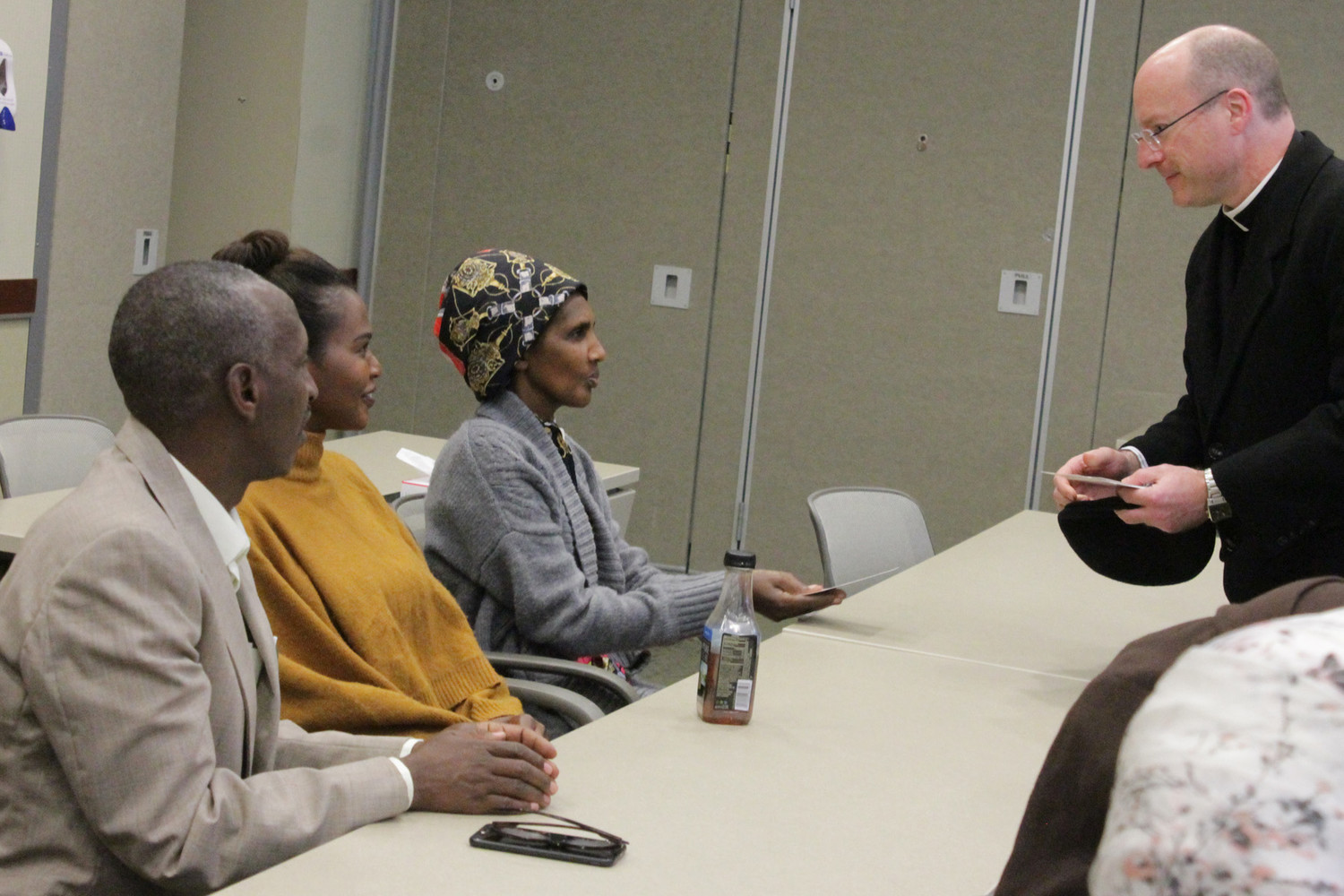Refugees among the first to greet Bishop McKnight
Although it’s not easy adjusting to life in a new country, Mohammed Hraishawi and his family are safe, full of joy and free of worry.
They’re also very grateful.
“Without all of this help and assistance, we would not be here and feel all of that safety and joy,” Mr. Hraishawi told Bishop W. Shawn McKnight two days before his ordination and installation as the fourth bishop of the Jefferson City diocese.
Bishop McKnight met Feb. 4 in Columbia with members of three refugee families recently resettled in the Columbia area through Refugee and Immigration Services (RIS) of Catholic Charities of Central and Northern Missouri (CCCNM).
Through a translator, Mr. Hraishawi said any struggles he, his wife and his family have had since arriving here in mid-December are mild compared to the relief of being safe and ready to start a new life.
“We really appreciate everything you have done for us,” he stated through the translator.
In addition to Mr. Hraishawi, his wife, Zainab, son Mohamad and baby Zahraa, all from Iraq; Bishop McKnight also met with Ahmed and Amal Al Ali from Syria; and David and Apeli Mberabagabo from the Democratic Republic of Congo.
Also present were CCCNM Executive Director Daniel Lester; Lorna Tran, Director and DOJ-Accredited Representative of CCCNM’s Refugee and Immigration Services; and Senad Music, RIS Office Manager and DOJ-Accredited Representative.
Bishop McKnight was in Columbia for a Rosary prayer service with the permanent deacons of the diocese and to join Deacon Gene Kazmierczak on patient visits at Boone Hospital Center.
The bishop asked if he could also meet with some refugees.
“I’m grateful for your presence and to be able to meet you,” he said after asking some questions about their as-of-yet short time in the United States. “As we receive, as God provides and blesses us with assistance and help, then it’s our joy to be able to help others.”
He greeted each of them, gave each a prayer card from his ordination, promised to keep praying for them and asked for them to keep praying for him.
“God bless you all. And thank you for your presence!” Bishop McKnight said at the end of their meeting.
Essential services
RIS, now an office of Catholic Charities and formerly an office of the diocese, has been working with the U.S. Conference of Catholic Bishops to resettle refugees since the Vietnam War and Cambodian crisis of the 1970s.
With an 11-member staff working in Columbia and Jefferson City, RIS provides essential services to arriving refugees, especially in the first 90 days after their arrival.
All of these refugees — who left their homes out of legitimate fear of death or serious injury — have been thoroughly vetted for security through the U.S. State Department. Many have been living in refugee camps for years. Most arrive with little more than the clothes on their backs.
RIS-provided services, funded through government grants and through contributions to Catholic Charities, include: finding and helping to pay for suitable housing, used furniture, clothing and food; providing English-language instruction, driver’s training and employment strategies and placement; and providing interpreter services, health-care facilitation, community information and referral, and extensive case management/counseling.
New beginnings
The RIS staff shared the families’ stories with Bishop McKnight ahead of time.
•Mr. Hraishawi has a master’s degree in electrical engineering and had a high-paying job in Iraq, most recently as an electrical engineer with the U.S. Army Corps of Engineers.
Mr. and Mrs. Hraishawi and their children ranging in age from 15 years to 4 months came to the United States with a special refugee status known as Special Immigrant Visa (SIV), which is predominantly for people who helped the U.S. government during or in the aftermath of the Iraq War.
“Once they’re found out, they often start getting death threats. People start coming after them because they’re seen as traitors,” said Ms. Tran.
SIV holders are usually processed more quickly and smoothly than regular refugee visas, because people who worked for the U.S. government have already had a security check.
Mr. Hraishawi hopes eventually to be able to work in a similar field in the United States.
“But you know: Dish washing? He’s fine with that right now,” said Ms. Tran. “‘My family is safe’ — that’s what matters to him now. Trying to get all of his diplomas to transfer and that kind of thing may take years, if ever. But they have nine kids, so he’s got to be working. But he’s as happy as he can be.”
•The Mberabagabo family are from the Democratic Republic of the Congo (DRC), where multiple conflicts affecting different parts of the country make it one of the most complex and challenging humanitarian situations in the world. More than 96,000 people remain displaced within the region.
David and Apeli Mberbagabo, their six children ranging in age from 12 to 22, and their 2-year-old granddaughter fled the DRC for a refugee camp in Uganda. They remained there until being resettled in Columbia in January of this year.
Other members of the family have been living in the area for several years and are now helping Refugee and Immigration Services with their adjustment.
Several in the family are already fluent in English, and all are determined to build a better life for themselves in the United States.
•The Al Ali family — Ahmed, Amal and their six children ranging in age from 15 to 3 — fled Syria to a refugee camp in 2012 and arrived in Columbia in 2016. They are among the more than 12 million people who have been displaced from Syria since the current conflict began there in 2011.
Ahmed and Amal came here seeking safety and a better life for their children, where they may have access to education, healthcare and employment opportunities and are removed from the threat of war and violence.
No one in the family spoke English when they arrived, but all the school-aged children have now become fluent speakers due to their immersion in public school.
“A big reminder”
After the gathering, Ms. Tran talked about how honored the families felt that the new bishop would want to meet with them.
“It means everything. It really does,” she said. “Showing that kind of interest, that kind of compassion — sometimes, just being in the same room with people — that goes such a long way toward helping them feel accepted.”
“It’s a big reminder,” Mr. Lester added, “of how much it means to Bishop McKnight, to Pope Francis and to all of us to continue to do this, continue to ‘welcome the stranger.’
“Especially in this political time and place, that’s a big reminder,” Mr. Lester said.









